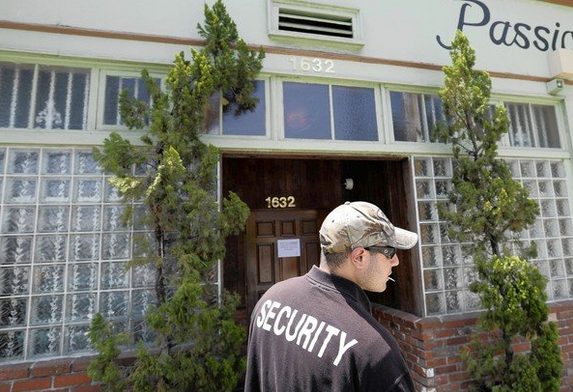Federal officials brought their war on medical marijuana dispensaries to Los Angeles on Tuesday, raiding several shops and issuing warning letters to dozens more.
Officials at the U.S. attorney’s office said it was the first large-scale federal action taken against cannabis shops in the city, and said more will probably follow.
“We couldn’t do all of L.A. at once,” said Thom Mrozek, a spokesman for the office. “There’s just too many stores.”
The crackdown adds a dramatic element to the already tense fight over the fate of medical marijuana dispensaries in the city. And it underscores the stern stance of the federal government that the sale and distribution of cannabis is illegal, no matter what cities do to try to regulate the industry.
Over the last year, federal authorities have targeted pot businesses across California, including a high-profile raid at a marijuana trade school in Oakland, where proceeds on medical marijuana are taxed.
The Southern California effort began in October in Orange County and has since moved east into the Inland Empire and north into Los Angeles County. “Now we have arrived at the city of Los Angeles,” Mrozek said.
Prosecutors went to court Tuesday to file civil asset forfeiture complaints against the owners of three Eagle Rock properties for allowing three commercial marijuana stores to operate: Together for Change Collective, House of Kush and ER Collective.
The Drug Enforcement Administration also executed search warrants at three locations — in downtown, Boyle Heights and Silver Lake.
Mrozek said authorities have mailed warning letters to the property owners and operators of an additional 67 dispensaries, mostly in Eagle Rock and downtown, giving them two weeks to comply with federal law. A marijuana business in Huntington Park, believed to be the only one in that city, was also told to shut down.
The actions come as L.A. officials and medical marijuana activists gear up for a ballot measure fight over the fate of a recent city ban on dispensaries.
The City Council approved a ban on the storefront sale of marijuana this summer, saying that each of the estimated 750 pot shops operating across the city must close. The ordinance would allow small groups of patients to grow and share the drug.
But before the ban went into effect, activists seeking to strike it down saw their challenge qualify for the ballot. That means the City Council now must choose whether to repeal the ordinance, replace it with a modified version or let voters decide. Several council members, including Jose Huizar, who pushed for the ban, say they intend to put the referendum on the March 5 ballot, when voters will choose a mayor, city controller, city attorney and eight council members.
Huizar, who represents Eagle Rock and much of downtown, cheered the federal crackdown and called on state legislators “to create a better way of providing access for seriously ill patients while removing the scores of profiteers and recreational users who currently dominate the market.”
Huizar and others complain that California’s law guaranteeing patients safe access to medical marijuana is too vague in how the drug should be regulated.
In the early days of President Obama’s tenure, Atty. Gen. Eric H. Holder Jr. said federal prosecutors would not target medical marijuana users and caregivers as long as they followed state laws. But as the risk of prosecution diminished, storefront dispensaries and enormous growing operations proliferated in California, often in brazen defiance of zoning laws and local bans.
Last year, the four U.S. attorneys assigned to the state announced that they were taking aim at large-scale growers.

